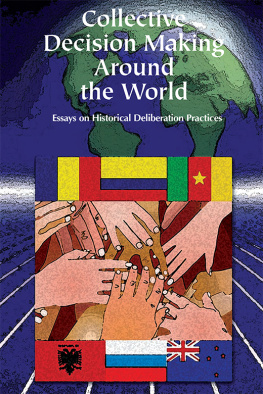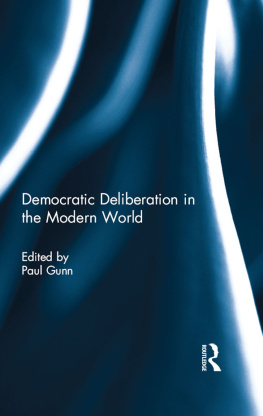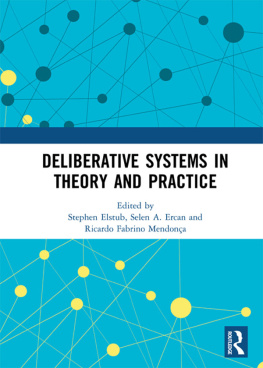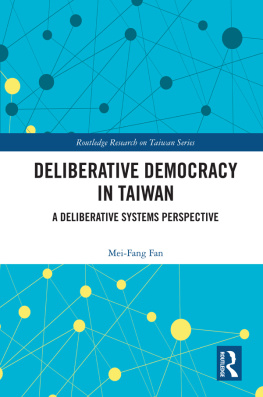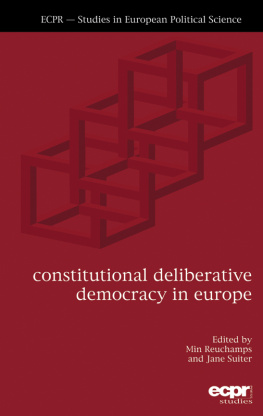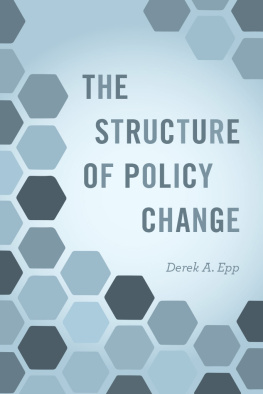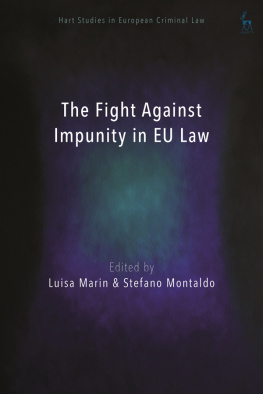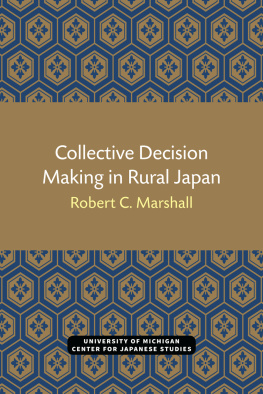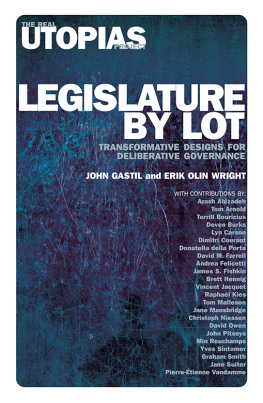Copy Editors: | Ellen Dawson-Witt, Lisa Boone-Berry |
Design and Graphics: | Longs Graphic Design, Inc. |
2006 by the Charles F. Kettering Foundation
ALL RIGHTS RESERVED
This book is published by Kettering Foundation Press. Any opinions, findings, conclusions, or recommendations expressed in this book are those of the authors and do not necessarily reflect the views of the Charles F. Kettering Foundation, its trustees, or its officers.
For information about permission to reproduce selections from this book, write to:
Permissions
Kettering Foundation Press
200 Commons Road
Dayton, Ohio 45459
This book is printed on acid-free paper.
First edition, 2006
Manufactured in the United States of America.
ISBN-978-0-923993-18-4
Library of Congress Control Number: 2006930841
The question of whether people have always engaged in public deliberation has often been posed at the Kettering Foundation. David Mathews, president of the foundation often says that deliberation is a natural process. Indeed, democratic practices probably appeared before the term democracy was invented, and direct self-rule through deliberative talk predates the Greeks in a number of cultures. Even though people may not have always deliberated by specifically spelling out pros, cons, and tradeoffs of different options, decisions based on alternative courses of action have often been made by communities.
At times, communities revert to deliberation as a kind of default mechanism during a crisis. For example, during the collapse of East Germany in 1989, citizens spontaneously began to organize round tables to explore what to do next.1 In Argentina, after the economic collapse in 2001-2002, neighbors flocked to the streets in front of their houses to talk about their problems.
This sort of crisis deliberation however is not usually sustained; democracy requires that we keep on deliberating beyond crisis situations. In Tupelo, Mississippi, it took a series of crises, combined with innovative leadership, to produce a long-term commitment to informal community deliberation.
The Kettering Foundation has been interested in this topic for over ten years. A background paper on this topic by Nolle McAfee and Denis Gilbert is included in this book following the introduction.
In 2003, the Kettering Foundation decided to sponsor a series of research papers on historic deliberation. The papers were written by international colleagues, none of them historians by profession. Despite the challenge of finding accurate historical records, we received ten case studies2 from eight countries that included accounts from colonial records of the open town meetings in nineteenth-century Colombia to an interview with an 81-year-old man in a mountainous region of eastern Romania. Six of these studies representing as many countries were selected to be included in this volume.
The first case study looks at traditional decision-making processes in Cameroon. Joseph Sany Nzima, the author, pays particular attention to the Baka people of his country. Next, Gabriel Murillo and Catalina Arreaza are the authors of a case study that describes the artisan democratic societies of Colombia in the nineteenth century. Daut Dauti of Kosova presents the ancient forms of public deliberation as found in one of the oldest codes of Albania, and David Robinson and Kayt Robinson conducted research on Pacific Ways of Talk in New Zealand.
The Romanian sfat, one of the oldest forms of deliberative assemblies in a community, is the topic of Ruxandra Petres case study. German Artamonov and Denis Makarov of Russia describe the early traditions of rural collective decision making in their country.
Sustainability
Most of the case studies reveal that particular manifestations of deliberation in its traditional form have died out. However, Russian peasant communities and their regional or tribal veches survived in some areas until 1917. The Council of Elders preceding meetings of the peasant assemblies included a singer to preserve organizational history. In Albania, communism put an end to centuries of deliberation fairly recently. The Illyrians used deliberation to control the power of kings as long ago as the eighth century. With the introduction of the Ottoman rule in the late fourteenth century, the Albanians withdrew to the highlands, and a ruler named Lek Dukagjini (1410-1481) wrote down and codified deliberative practices that had been valued and passed on for centuries. These practices continued among Albanians in Kosova and survived the loose Yugoslav version of communism until the United Nations occupied the country in 1999 and began promoting Western-style democracy.
The practices of Hui in New Zealand and Talanoa in Fiji survived to the present day, perhaps because of references to people from the past not present in the room. In Fiji, a modern version of Talanoa has been used to heal polarization among politicians. In Romania, seven unusually prosperous small mountain towns where deliberation is still practiced were discovered. And among the Baka, or Pygmy, in Cameroon, deliberation remains a key to the survival of small hunting-and-gathering communities.
The diversity of cases, despite the fact that only a few have survived, suggest, rather paradoxically, that deliberation may be widespread, albeit ephemeral, throughout the world and throughout history.
Contrasts with Modern Deliberation
How do historic examples of deliberation differ from present practices? In Fiji and among the Mori people of New Zealand, the Talanoa and Hui provide opportunities for all voices to be heard, not just all views, as in a modern forum. National assemblies and regional assemblies in Albania used the phrase to beat a matter the way Americans would say to beat a matter to death. Deliberations among the Baka in Cameroon sometimes last for many days.
A second major distinction with modern forums is that traditional deliberation did not typically include women or young people. In Albania, citizens were represented by household heads, and in Russia, every tenth head of a household was drafted to serve in the peasant assembly. Among the Mori in New Zealand, women convene the Hui but are not part of it. Here again, however, there are exceptions. Among the Baka in Cameroon, deliberation is based on horizontal kinship, and everyone in a community of 1,000 is important for survival. No one has institutionalized power; authoritarianism is criticized; and leadership shifts, depending on talents and tasks at hand.

